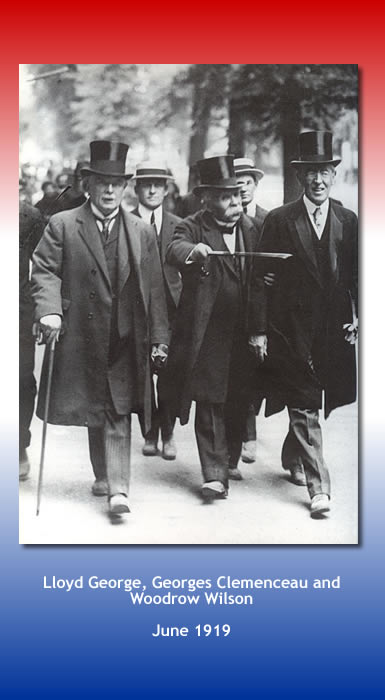Infectious Diseases Case of the Month
4th of July Special Edition |
||||||
 |
President Woodrow Wilson became acutely ill in April 1919 in midst of negotiations that led to the Treaty of Versailles concluding World War I. Hostilities had ended on November 11, 1918 when an armistice had been arranged between Germany and the Allied Powers. Settlement talks that would lead to the Treaty of Versailles began on January 19, 1919. U.S. President Woodrow Wilson became the first sitting U.S. President to travel overseas while in office when he traveled to Paris to participate in the talks. Germany was excluded from the talks until near their conclusion, and Russia was not invited. The talks were dominated by David Lloyd George, Prime Minister of the United Kingdom, Georges Clemenceau, Prime Minister of France, and President Wilson (see photo at left). Wilson, son of a Presbyterian minister and an idealist, favored settlement based on his Fourteen Points (see address to Congress, January 8, 1918) including the idea for an international governing body known as the League of Nations. Clemenceau and Lloyd George, interested in protecting their own national interests and in punishing the Central Powers, opposed many of Wilson's idealistic proposals. In the midst of difficult negotiations Wilson developed his acute illness. On the evening of April 3rd Wilson was suddenly "seized with paroxysms of coughing, which were so severe and frequent it interfered with his breathing." His physician further noted fever to 103o and profuse diarrhea. For several days he was confined to bed. On day five of his illness, he insisted on resuming the work of peace negotiation receiving Clemenceau and Lloyd George as he lay in his sickbed. He slowly recovered but observers including Herbert Hoover noted a change in Wilson's demeanor and incisiveness after his illness noting a new obsession with trivial details and loss of mental "resiliency." Lloyd George commented on Wilson's "nervous and spiritual breakdown in the middle of the Conference." Still on his sickbed Wilson abruptly yielded to the demands of Clemenceau in respect to settlement issues apparently abandoning principles he had previously insisted on. The resulting agreement led to the The Treaty of Versailles signed by Germany and the Allies on June 28, 1919. Exacting a harsh punishment, the Treaty forced Germany to accept full responsibility and blame for the war. This provided the basis for the astronomical reparations demanded by the Allies (initially 269 billion gold marks). Beyond this, the Treaty gave territory from Germany to a number of surrounding countries, stripped Germany of all overseas and African colonies, and strictly limited its military. The humiliation and economic cost from these demands are often blamed for the failure of the Weimar Republic in 1933 and Hitler's rise to power. Some have speculated that Wilson's acute illness somehow influenced his behavior in compromising with Lloyd George and Georges Clemenceau. If so, the illness has had profound effect on subsequent history. Others have suggested that Wilson's overarching interest in the creation of The League of Nations prompted him to compromise. In a final irony, the U.S. Senate refused to ratify U.S. participation in the League of Nations. |
|||||
|
Answer and commentary will follow your submission. |
|||||